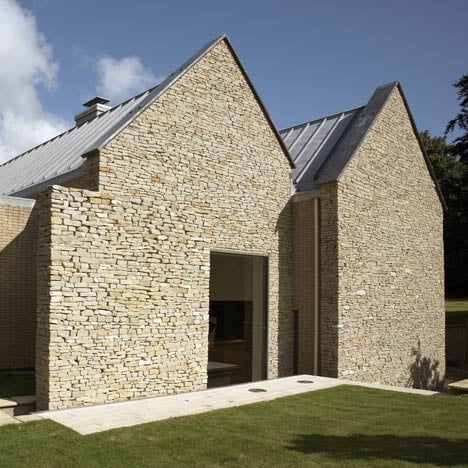An electronically controlled stone wall slides across the facade of this house in Warwickshire, England, to conceal a large window.
Designed by British architects Baynes & Co, Wickstead Lodge replaces a traditional vernacular house that formerly occupied the site.
The moving wall was created to overcome a planning requirement stating that the new house should have only small windows, like its predecessor.
Narrow gaps in the stonework let light pass through the wall into the dining room behind.
The whole of this lower floor was also set just below ground level so that the two-storey house wouldn't be taller than permitted.
We also recently featured a house in Bath constructed from a similar pale stone - take a look here.
Photography is by Stuart Whipps.
The text below is a description from Adrian Baynes:
The project was a new house to replace an existing one.
The planning authority imposed considerable constraints in terms of massing, roof height, materials & design.
They wanted a replacement single storey house, with small windows, of traditional construction.
The client wanted a two storey, contemporary house.
The solution was to sink the building into the ground and create three gables so as to minimise the impact from the road.
However from the rear it is a substantial two storey development.
The biggest difficulty was the planners requirement for small windows to match those in the original house.
The answer was to install the largest double glazed window available and then construct a steel framed stone wall in front of it.
The stone was bonded in place so as to allow the light to penetrate through the joints.
However the entire wall was mounted on an geared electric motor powered track to allow it to move like a giant curtain.
By careful engineering the wall was mounted without any top support.
The building was constructed with stone gables & a matching brick, with terne coated stainless steel roof with roll batten joints to replicate a traditional lead roof.

